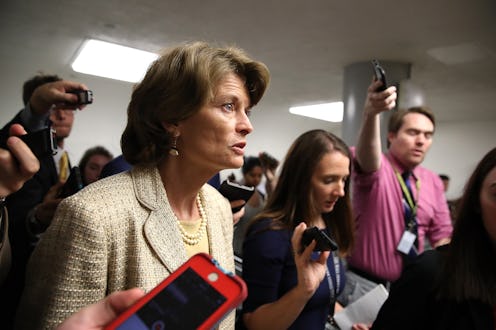News
Lisa Murkowski Could Stop Republicans & Save Obamacare Yet Again

When Republicans failed on the "skinny repeal" bill two months ago, most Americans assumed that meant the Affordable Care Act (ACA) was here to stay. Yet, a final ACA repeal effort known as Graham-Cassidy has come roaring out of the old bill's ashes, throttling towards a vote with unexpected momentum. And as was also true in July, Alaska Sen. Lisa Murkowski could be the deciding Graham-Cassidy vote.
Senate Majority Leader Mitch McConnell has said that he would bring Graham-Cassidy up for a vote if he can secure 50 votes. Already, Republican Sens. Rand Paul and Susan Collins have indicated that they're against it. That leaves Murkowski as the deciding vote once again, and according to CNN, it all depends on what Graham-Cassidy will do for Alaska.
The different factions within the Republican Party — with their divergent approaches to governance and the priorities — goes a long way in explaining why the unified cry of "repeal and replace" became much trickier when actual legislation was required. Small government devotees like those in the Freedom Caucus generally want to cut health care spending, get rid of the individual mandate to buy insurance, and deregulate as much as possible. Those are emphatically not goals Alaskans benefit from, and Murkowski knows it.
Alaska has the highest health care costs in the country. Part of that is an unavoidable consequence of its geography — Alaska is the largest state in the America, twice the size of Texas. Its sparse population is spread out over a vast terrain of often challenging topography. So the supply of medical care professionals is often an issue in and of itself.
But under the ACA, Alaska expanded its Medicaid program and has seen tens of thousands of residents sign up and gain insurance, many for the first time. “I want greater access and lower costs. So far, I'm not seeing that happen," Murkowski told Vox reporter Dylan Scott shortly before voting down the skinny repeal.
There doesn't seem to be much (or any) effort to provide "greater access" through Graham-Cassidy, though some states might be able to swing "lower costs." That's due to the bill's restructuring of federal health care funding to states. Under its proposed block grant distribution scheme, states that did not expand Medicaid — mostly red states — would see an increase in funding. States that spent more on Medicaid, like Alaska, would see their funding cut.
Another major issue she's taken with the GOP's different Obamacare repeal bills in the past is the defunding of Planned Parenthood. Murkowski has said she is "committed" to "keeping Planned Parenthood" funding intact. That commitment will loom large over her vote, considering Graham-Cassidy bars federal funding (i.e., Medicaid) from going to Planned Parenthood.
McConnell has promised to bring Graham-Cassidy to the floor for a vote if and when he has a guaranteed 50-vote minimum in favor. With their 52-vote Senate majority, a united Republican effort would make the passage of Graham-Cassidy unstoppable. However, Paul and Collins' early opposition means that all eyes are on Murkowski in weighing its chances.
In vocalizing his opposition to Graham-Cassidy, Paul called it "Obamacare 2.0" and said that it didn't go far enough to undo the ACA's provisions. Maine's Sen. Collins — who, along with Murkowski, rejected earlier repeal efforts — also indicated that she has serious concerns about Graham-Cassidy. Maine would lose an estimated $115 million if it passed
So it appears that this would be up to Murkowski. Robert Costa noted in a tweet that her move towards a "yes" on Graham-Cassidy would put enormous pressure on the remaining 49 Republicans to vote yes, too. After all, this is almost certainly the last chance Republicans will have to prove they can actually follow through on their years-long promise. if Murkowski is on board, word on the street is her fellow Republican senators will likely join her.